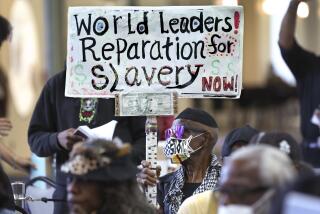Japan Should Pay for Individualsâ Suffering
In December 1937, the invading Japanese army captured Nanjing, then the capital of China, and proceeded to rape, torture and execute many thousands of Chinese civilians and unarmed prisoners of war. The facts of this atrocity are not in dispute, although controversy still surrounds the absolute numbers of Japanâs victims. Survivors of this and other instances of Japanâs brutality during wartime--in violation of international treaties to which Japan was a signatory--have repeatedly sought compensation from the Japanese government for their suffering. On Sept. 22, 1999, the chief judge of the Tokyo District Court dismissed the most important case concerning the Nanjing massacre on grounds that individuals do not have the right to sue the Japanese government.
It is in part because the Japanese courts have never ruled in favor of Japanâs victims that California and other American states recently passed laws allowing former prisoners of war to sue American branches of Japanese corporations for compensation for their suffering. In August 1999, the California Legislature passed a resolution calling on Japan to pay reparations to âUnited States military and civilian prisoners of war . . . the survivors of the âRape of Nankingâ [Nanjing] . . . and the women who were forced into sexual slavery and known by the Japanese military as âcomfort women.â â It also extended the statute of limitations for World War II lawsuits to 2010.
During World War II, 33,587 U.S. military and 13,966 civilian prisoners of the Japanese military were confined in prison camps, where many were subjected to forced labor. Last September, 500 of these survivors filed a nationwide class-action lawsuit against five Japanese corporations with branches in the United States, charging them with war crimes and seeking court-ordered reparations. The companies are Mitsubishi International Corp., Mitsui & Co. (USA), Nippon Steel, Kawasaki Heavy Industries, Ltd., and Showa Denko Co.
These lawsuits are likely to be much more damaging to Japanese-American relations than any genuine governmental apology and the payment of token compensation. Japanâs official response has been to stonewall and to argue that the peace treaty of 1952 settled all claims arising from the war. There is a possible Japanese defense against these lawsuits, but this is assuredly not it. International law has now progressed to where claims by an individual against a state are recognized. Moreover, Germany already has agreed to pay large sums to compensate its forced laborers--in addition to the billions it has paid to other survivors of the Nazi genocide against Jews and to Israel.
Relying on the peace treaty is not a good defense for several reasons. First, the suits are not against the Japanese government but against private Japanese corporations. Second, the United States required that Japan pay only minimal reparations after the war because it was trying to integrate Japan into Americaâs Cold War structure. Third, the reparations Japan did pay went primarily to corrupt dictators in places like the Philippines, Indonesia and Burma, not to individuals who had truly suffered at Japanâs hands. Fourth, the precedent of holding Germany, Switzerland and American corporations such as the Ford Motor Co. responsible for their wartime activities is clearly applicable to Japan.
Japanâs only real defense would be that it was the U.S. government that refused to press the claims of its own citizens against Japan. Gen. Douglas MacArthur decided to exonerate the emperor from any responsibility for the war--thereby causing most Japanese to believe that if the head of state was not responsible, then ordinary people and companies certainly were blameless. The surviving American prisoners of war thus could make as good a case against their own governmentâs indifference to their suffering as against Japanese corporations.
Instead of stonewalling, the Japanese government would be wise to take these suits as an opportunity to deal with some of the unfinished business of World War II. Thanks to the Cold War, Japan enjoyed a long period in which the United States blocked all private claims against it. Today, most of the plaintiffs in these cases are very elderly. It would be easy for Japan to pay them. Since World War II, the only two countries that have indicted their own citizens for war crimes are Germany and France. But this is not something that either Japan or the United States should be proud of. A trial like that in France in 1997 of Maurice Papon, the wartime mayor of Bordeaux, for collaborating in the deportation of Jewish civilians to Germany is simply unimaginable in Japan. That is what is fueling these lawsuits, as much as monetary claims.
More to Read
Sign up for Essential California
The most important California stories and recommendations in your inbox every morning.
You may occasionally receive promotional content from the Los Angeles Times.










